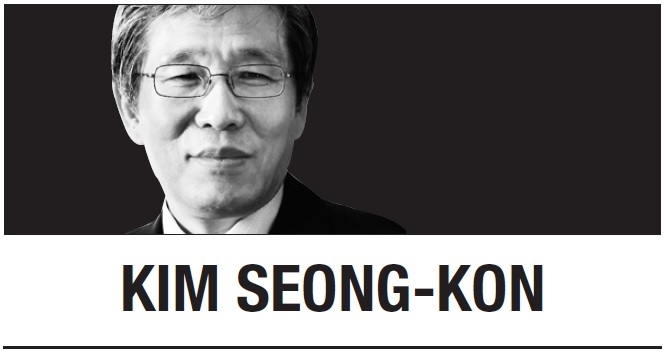[Kim Seong-kon] Korean women’s discontent with men
By Kim Seong-konPublished : June 2, 2021 - 05:30

Recently, a historian revealed that the famous 16th-century Korean poet Heo Nanseol-heon left a sad will when she committed suicide at the age of 26. In her will, Heo wrote that she was miserable all her life because of two things: One was that she was born in Joseon, which is today’s Korea, and the other was that she married a Korean man.
In her time, the chauvinist male-dominated Joseon society harbored relentless prejudice against woman writers. Her own mother-in-law was no exception. She burnt her daughter-in-law’s precious manuscripts of poems and writings. Yet her husband, who was a typical mama’s boy, neither defended nor protected his wife. As a result, Heo had to end her life in disillusion in her mid-twenties due to her inconsiderate, irresponsible husband, not to mention her cruel mother-in-law who ruthlessly abused her daughter-in-law.
The times have changed now. Today, Korean women writers enjoy enormous popularity among ardent readers, both domestic and overseas. Besides, Korea is no longer a male chauvinist society. Husbands in the younger generation now treat their wives with respect. One can even find quite a few henpecked husbands in today’s Korean society. As the society has changed, even traditionally notorious Korean mothers-in-law, too, no longer dare to maltreat or abuse their daughters-in-law these days.
Nevertheless, “old habits die hard” and some things never change. Korean women complain that today’s Korean men carry many of the undesirable traits of their ancestors. For example, many Korean men are still mama’s boys who take the side of their mothers against their wives or deliberately look the other way when their spouse and mother are in dispute. As a result, many Korean men are not only dependent on their mothers, but also seriously lack a sense of responsibility for their home and wife, who they should protect.
There are other undesirable traits in Korean men. Like their ancestors, today’s Korean men, too, still flock together and build factions. As a result, they are hostile toward other factions and even condemn them as accumulated evils to purge. Aside from hopelessly factional political arenas, numerous associations, societies, and clubs antagonize one another in today’s South Korea. This hopelessly narrow-minded group mentality has fostered hostility toward other groups and factions. It is no wonder, therefore, that Korean men are not sociable with foreigners.
A newspaper columnist has recently pointed out that Korean men exhibit some deplorable characteristics when they are overseas. For example, many Korean men do not or cannot have good friends overseas, not to mention best friends. Perhaps the language barrier contributes to this problem, as well as, in some cases, a lack of adequate knowledge of social etiquette.
According to the columnist, Korean men generally prefer sitting to standing, so they are not good at mingling around in a Western party where everybody is standing, holding a glass of wine while conversing with a variety of people. Indeed, Korean men like to sit around a table, sometimes cross-legged, with their friends and colleagues, pouring wine for one another and chatting loudly over drinks, rather than standing and mingling with strangers.
Then the columnist amusingly mentions that even though Korean men are not good at conversing with foreigners in a foreign language, they are very good at yelling at their wives and children in Korean. It reminds us of a Korean maxim, “A general with a broken leg harangues inside the castle only.” Unsurprisingly, in the eyes of Korean women, such incompetent, short-tempered Korean men are an embarrassment at best.
Another undesirable characteristic of Korean men is that they do not know the world and their situation in it. It is no wonder, then, that they are not good at diplomacy and foreign affairs. Like their ancestors, who were ignorant of the changing state of international politics, today’s Korean politicians seem to want Korea to be isolated in the international community, given their myopic decisions and wrong-headed policies.
During the late Joseon Dynasty, our political leaders were confused and bewildered between China and Japan, or between UK and Russia, and consequently lost the sovereignty of their country. Today, Korean political leaders are facing a similar situation. Standing timidly and awkwardly between China and the US, Korean political leaders, once again, do not seem to know what is in the best interest of South Korea.
It would be lamentable if Korean men inherited their ancestors’ flaws and incompetence. Today’s Korean men should let the world know that they are open-minded, competent, and, above all, reliable and trustworthy.
Kim Seong-kon
Kim Seong-kon is a professor emeritus of English at Seoul National University and a visiting scholar at Dartmouth College. The views expressed here are his own. -- Ed.









![[Kim Seong-kon] Democracy and the future of South Korea](http://res.heraldm.com/phpwas/restmb_idxmake.php?idx=644&simg=/content/image/2024/04/16/20240416050802_0.jpg&u=)







![[KH Explains] Hyundai's full hybrid edge to pay off amid slow transition to pure EVs](http://res.heraldm.com/phpwas/restmb_idxmake.php?idx=652&simg=/content/image/2024/04/18/20240418050645_0.jpg&u=20240418181020)

![[Today’s K-pop] Zico drops snippet of collaboration with Jennie](http://res.heraldm.com/phpwas/restmb_idxmake.php?idx=642&simg=/content/image/2024/04/18/20240418050702_0.jpg&u=)